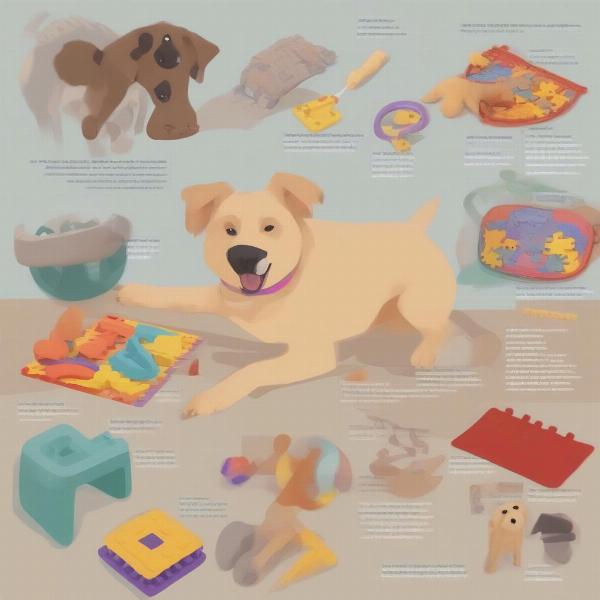Losing a cherished dog is a heart-wrenching experience. The pain of their absence can be overwhelming, and if you have other dogs, you might notice changes in their behavior, including fighting. This is a difficult situation, so let’s explore why this happens and what you can do to help your remaining canine companions cope with the loss and restore harmony in your home. “Alfita dog passes away now other 2 dogs are fighting” is a heartbreaking search query, reflecting the pain and confusion many owners experience. This article addresses this issue directly, offering practical advice and support.
Dogs, although they don’t understand death in the same way humans do, form strong bonds with their canine and human family members. When a member of their pack passes away, they grieve. This grief can manifest in various ways, including changes in appetite, sleep patterns, increased anxiety, and altered social dynamics. The established hierarchy within the dog pack can be disrupted by the absence of a member, leading to tension and sometimes aggression as the remaining dogs try to re-establish their roles. This can result in fighting, even if they’ve previously coexisted peacefully. Understanding these underlying reasons is the first step in helping your dogs navigate this difficult period.
Understanding Canine Grief
Dogs experience grief, though it’s expressed differently than in humans. They may become withdrawn, less playful, or show a lack of interest in activities they once enjoyed. Some dogs may search for their deceased companion, whine, or exhibit changes in sleeping and eating habits. Recognizing these signs is crucial for providing the right support.
Why Dogs Fight After a Companion’s Death
The established pack hierarchy is disrupted when a dog passes away. The remaining dogs may then challenge each other for dominance, leading to fights. This is especially true if the deceased dog held a high rank in the pack. Additionally, the stress and anxiety caused by grief can heighten tensions and make dogs more reactive, increasing the likelihood of conflict.
Helping Your Dogs Cope with Loss and Fighting
Creating a stable and comforting environment is essential. Maintain consistent routines for feeding, walks, and playtime. This provides a sense of normalcy and security during a time of upheaval. Offer extra love and attention to your grieving dogs, but avoid overly comforting them as this can reinforce negative behaviors. Instead, focus on positive reinforcement and rewarding calm behavior.
Managing Conflict and Re-establishing Harmony
If fights do occur, separate the dogs immediately and calmly. Avoid punishing them, as this can exacerbate the problem. Consult with a certified dog trainer or veterinary behaviorist for guidance on managing conflict and re-establishing a peaceful dynamic. They can offer tailored strategies based on your dogs’ individual personalities and the specific circumstances.
Providing Individual Attention and Enrichment
Spend quality time with each dog individually, engaging in activities they enjoy. This strengthens your bond and helps them feel secure. Provide mental and physical enrichment through puzzles, interactive toys, and regular exercise. This helps alleviate stress and boredom, which can contribute to negative behaviors.
 Dog Enrichment Activities
Dog Enrichment Activities
Conclusion
Dealing with the loss of a dog and the subsequent fighting among remaining dogs is challenging. Understanding canine grief and the disruption to pack dynamics is key to providing the right support. By maintaining consistent routines, offering individual attention, managing conflict effectively, and providing enrichment, you can help your dogs navigate this difficult time and create a harmonious environment. Remember, patience and understanding are crucial during this process. If you continue to experience difficulties, seeking professional guidance from a certified dog trainer or veterinary behaviorist is highly recommended. Addressing the issue of “alfita dog passes away now other 2 dogs are fighting” requires empathy, understanding, and practical solutions. This article aims to provide all three, helping dog owners navigate this difficult experience.
FAQ
- How long does canine grief last? There’s no set timeframe for canine grief, as it varies depending on the individual dog and the strength of their bond with the deceased companion. It can last for weeks, months, or even longer.
- Is it normal for dogs to fight after a companion dies? Yes, it’s relatively common. The disruption to the pack hierarchy and the stress of grief can lead to increased tension and conflict.
- Should I punish my dogs for fighting? No, punishment can worsen the situation. Focus on separating them calmly and addressing the underlying causes of the conflict.
- When should I seek professional help? If the fighting is severe, frequent, or you’re struggling to manage the situation, consult a certified dog trainer or veterinary behaviorist.
- Can I introduce a new dog to help my grieving dogs? Introducing a new dog too soon can add further stress and potentially escalate conflict. It’s generally best to wait until your remaining dogs have had time to adjust to the loss.
- What are some other signs of canine grief? Changes in appetite, sleep patterns, increased anxiety, withdrawal, and searching for the deceased companion are common signs.
- How can I create a stable environment for my grieving dogs? Maintaining consistent routines, providing individual attention, and offering enrichment activities can help create a sense of security and normalcy.
ILM Dog is your trusted international resource for all things dog-related. We provide expert advice on dog breeds, health, training, nutrition, grooming, and much more. From puppy care to senior dog support, we cover every stage of your dog’s life. Our articles are written by experienced dog professionals, providing you with practical tips and insights to ensure your canine companion thrives. For personalized advice on your unique situation, from breed selection to behavioral issues, contact us at [email protected] or +44 20-3965-8624. ILM Dog is here to support you and your furry friend every step of the way.